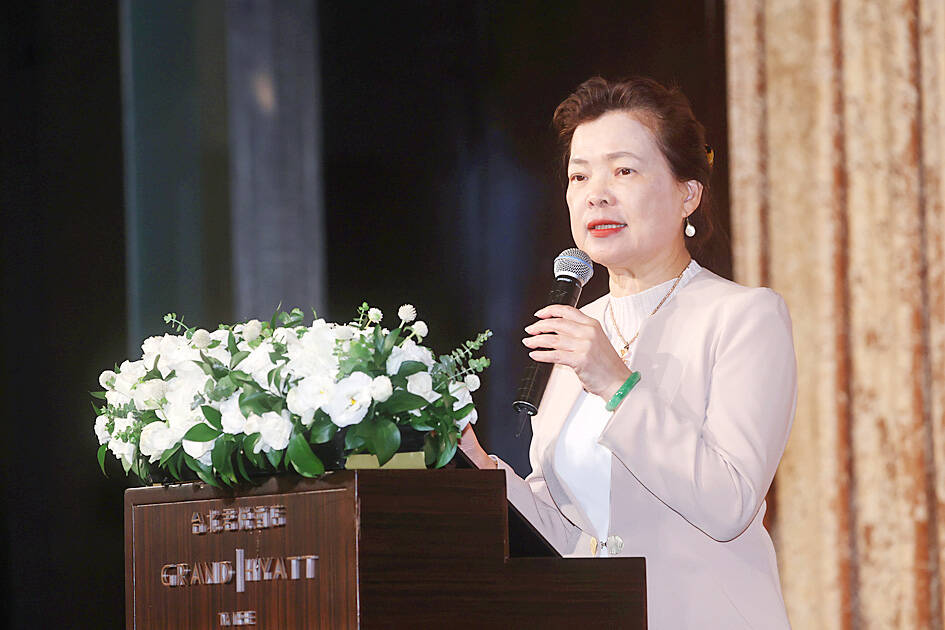Minister of Economic Affairs Wang Mei-hua (王美花) is leading a delegation to the US this week for the first in-person meeting of the Technology Trade and Investment Collaboration (TTIC) framework, the ministry said.
Wang is expected to discuss why Taiwanese security is essential to global industrial development and supply chains, a ministry official said on Friday.
US Secretary of State Antony Blinken last month said in a television interview that an attack on Taiwan would devastate the global economy, given that the nation produces most of the world’s semiconductors.

Photo: CNA
The TTIC, established in December last year, is a bilateral cooperation framework for Taiwan and the US to develop commercial programs and strengthen critical technology supply chains.
According to the US Department of Commerce, the TTIC aims to promote two-way investment, study industry trends and explore new opportunities for investment in the US market.
The official said US officials are to discuss the benefits to Taiwanese of the CHIPS and Science Act and the Inflation Reduction Act.
The CHIPS act provides subsidies to investors to increase semiconductor production in the US market, while the Inflation Reduction Act attempts to curb inflation by cutting the deficit, lowering prescription drug prices and investing in domestic energy production while promoting clean energy.
Wang is also scheduled to open the first Taiwan Expo USA in Washington on Wednesday, the ministry said.
The three-day exhibition is to focus on a range of industry developments such as 5G, smart cities, smart vehicles, smart healthcare, tourism, culture and food to better present Taiwan to the world, it said.
Wang and her delegation also plan to visit US companies and business associations during the trip in a bid to boost exchanges and cooperation in global supply chains, the ministry said.
The delegation plans to visit several companies headquartered in Silicon Valley that have close business ties with Taiwan’s semiconductor suppliers.
The visits aim to encourage US firms to enhance the resilience and security of Taiwan’s supply chain through investment, the ministry said.
The ministry expects the delegation to help create business opportunities for Taiwan and the US in the global market, and have insightful discussions on geopolitical issues, it said.
Taiwan and the US participate in two other high-level bilateral economic dialogue platforms — the Trade and Investment Framework Agreement and the US-Taiwan Economic Prosperity Partnership Dialogue. The two have also started the US-Taiwan Initiative on 21st Century Trade dialogue.
Trade between Taiwan and the US last year topped US$100 billion for the first time, the ministry said.

Stephen Garrett, a 27-year-old graduate student, always thought he would study in China, but first the country’s restrictive COVID-19 policies made it nearly impossible and now he has other concerns. The cost is one deterrent, but Garrett is more worried about restrictions on academic freedom and the personal risk of being stranded in China. He is not alone. Only about 700 American students are studying at Chinese universities, down from a peak of nearly 25,000 a decade ago, while there are nearly 300,000 Chinese students at US schools. Some young Americans are discouraged from investing their time in China by what they see

MAJOR DROP: CEO Tim Cook, who is visiting Hanoi, pledged the firm was committed to Vietnam after its smartphone shipments declined 9.6% annually in the first quarter Apple Inc yesterday said it would increase spending on suppliers in Vietnam, a key production hub, as CEO Tim Cook arrived in the country for a two-day visit. The iPhone maker announced the news in a statement on its Web site, but gave no details of how much it would spend or where the money would go. Cook is expected to meet programmers, content creators and students during his visit, online newspaper VnExpress reported. The visit comes as US President Joe Biden’s administration seeks to ramp up Vietnam’s role in the global tech supply chain to reduce the US’ dependence on China. Images on

New apartments in Taiwan’s major cities are getting smaller, while old apartments are increasingly occupied by older people, many of whom live alone, government data showed. The phenomenon has to do with sharpening unaffordable property prices and an aging population, property brokers said. Apartments with one bedroom that are two years old or older have gained a noticeable presence in the nation’s six special municipalities as well as Hsinchu county and city in the past five years, Evertrust Rehouse Co (永慶房產集團) found, citing data from the government’s real-price transaction platform. In Taipei, apartments with one bedroom accounted for 19 percent of deals last

US CONSCULTANT: The US Department of Commerce’s Ursula Burns is a rarely seen US government consultant to be put forward to sit on the board, nominated as an independent director Taiwan Semiconductor Manufacturing Co (TSMC, 台積電), the world’s largest contract chipmaker, yesterday nominated 10 candidates for its new board of directors, including Ursula Burns from the US Department of Commerce. It is rare that TSMC has nominated a US government consultant to sit on its board. Burns was nominated as one of seven independent directors. She is vice chair of the department’s Advisory Council on Supply Chain Competitiveness. Burns is to stand for election at TSMC’s annual shareholders’ meeting on June 4 along with the rest of the candidates. TSMC chairman Mark Liu (劉德音) was not on the list after in December last